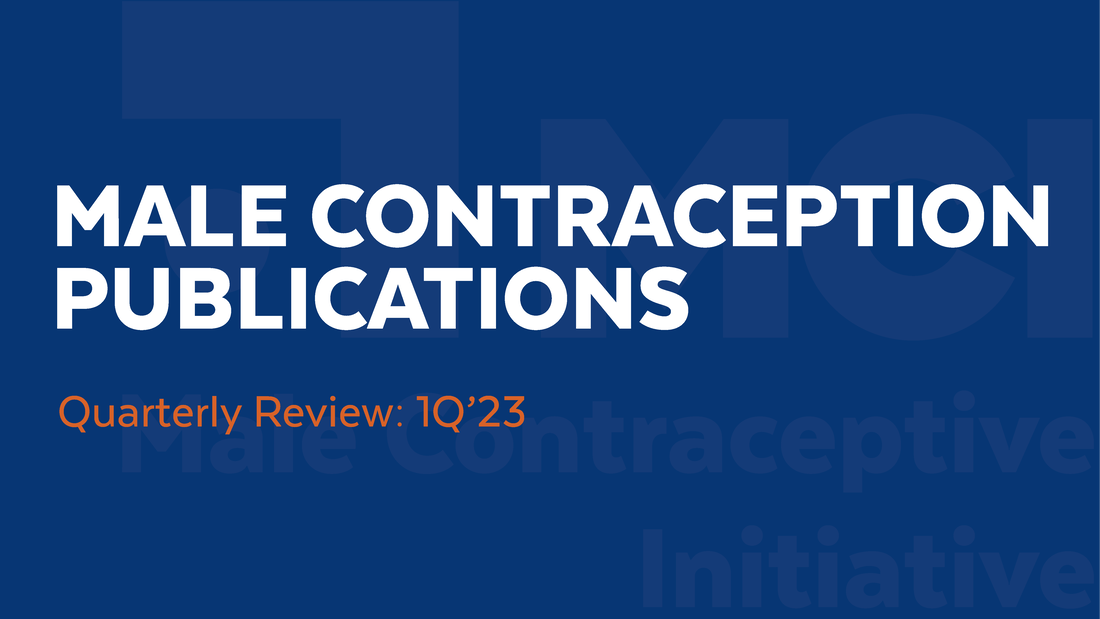|
This blog series highlights pertinent publications that were featured in MCI's monthly newsletter editions in the first quarter of 2023. The purpose of this blog is to report interesting or relevant work from MCI Fellows, Grantees, staff members, and other community authors in the field of male contraception. This paper from former MCI Fellow Melanie Balbach and current MCI grantees Jochen Buck and Lonny Levin outlines a proof-of-concept for an innovative on-demand contraceptive, where a man would take a birth control pill shortly before sex, only as needed to avoid causing a pregnancy. Soluble adenylyl cyclase (sAC) is an enzyme essential for sperm motility and maturation. The birth control pill inhibits sAC with a single dose in male mice, leaving them temporarily infertile. Fertility in mice fully returns the next day, and normal mating behavior is still displayed. These results show that the sAC inhibitor could be translated to contraception for human males, therefore creating an additional method of contraception for men and couples. This paper from former MCI Fellow Max Lyon identifies the first selective inhibitor for human SLO3—VU0546110—and shows that it completely blocked heterologous SLO3 currents and endogenous K+ currents in human sperm. This compound also prevented sperm from hyperpolarizing and undergoing hyperactivated motility and induced acrosome reaction, which are necessary to fertilize an egg. The authors conclude that SLO3 is the sole K+ channel responsible for hyperpolarization and significantly contributes to the fertilizing ability of human sperm. Moreover, SLO3 is deemed to be a good candidate for contraceptive development, and mutation of this gene is a possible cause of idiopathic male infertility. Reproductive responsibilities are often solely on the shoulders of the childbearing partner in heterosexual relationships, including physical, emotional, mental, and financial burdens in preventing pregnancy. This scoping review sought to explore how reproductive responsibilities were defined and negotiated in both casual and long-term heterosexual relationships during reproductive life events. Barriers were identified to the engagement of reproductive work and included lack of male-controlled contraception, poor sexual health knowledge, financial limits, traditional gender roles, and feminisation and family planning services. Studies identified nuanced ideas of sharing reproductive responsibilities, such as companionship during reproductive health appointments, supporting contraceptive use during intercourse, and sharing costs of reproductive healthcare. This article discusses work from the lab of MCI grantee Mariano Buffone regarding CatSper, a calcium ion channel on the tails of sperm that regulates sperm motility. CatSper is a sperm-specific ion channel, and one of the most highly sought-after male contraceptive targets. However, its complexity has hindered those working with it to yet discover a way to block it. This paper outlines methods of high-throughput screening for drugs with the capacity to block CatSper in mammalian sperm. This enables large screening experiments for drug discovery through the use of live cells in experiments. There is no “silver bullet” for contraception. One single method will not meet the needs of all users, nor is one method likely to meet the needs of a single user throughout their reproductive lifespan. This paper used in-depth interviews with over 30 individuals of reproductive age to outline a person's contraceptive journey in four phases: identification of need, method initiation, method use, and method discontinuation. Within these phases, there were five main areas of decisional influence: physiological factors, values, experiences, circumstances, and relationships. Authors found through the interviews that contraception is a unique health intervention, and therefore there is no “right” answer. Because of this conclusion, more methods should be developed in order to meet the needs of individuals. New fatherhood can be a profound change in a man’s life, especially when a pregnancy may not have been planned. Little is known about the experiences of men who become fathers unintentionally or reluctantly, so this paper evaluated the emotional responses, appraisals of family functioning, and relationships with infants among men in an online, anonymous setting. Findings showed that men use online forums to ask for or offer advice, normalize the difficulties of feelings, and offer perspective. Additional findings exhibited that fathers’ main concerns were about their mental health, bonding with the baby, relationships with partner and family, and finances. Feelings from fathers existed on a spectrum of emotions including regret, resignation, ambivalence, acceptance, and excitement. Are there any interesting publications about non-hormonal, reversible male contraception that you'd like to see featured? Please reach out to us and share your thoughts!
0 Comments
Your comment will be posted after it is approved.
Leave a Reply. |
Categories
All
Archives
June 2024
|
|
|
Donate to Male Contraceptive InitiativeYour generous donation makes a difference!
|
© Male Contraceptive Initiative. All rights reserved.





 RSS Feed
RSS Feed
